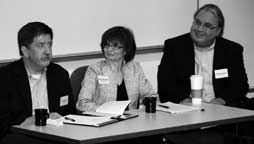By Kendra Ludwick/reporter

Good writing and speaking skills are essential for a career in mass media, several speakers said at a journalism conference Saturday at Texas Christian University.
Sponsored by the Fort Worth Chapter of the Society of Professional Journalists, the conference featured speakers in several areas of communications.
Every speaker said networking and internships are important in getting a journalism job.
“A person needs to be passionate about what he does and want to get up every morning and go to work,” Karen Borta, anchor with CBS Channel 11, said.
Borta, who has won many awards for her news coverage and anchor team, had to make sacrifices to get where she is today as an anchor.
“I made more money at my waitress job in college than at my first job out of college,” she said.
Since she did not make a lot of money, Borta ate crackers and gave up certain things.
“It was well worth it in the end,” she said.
Borta believes the Internet has good information, but it is not the source for news.
“I don’t believe the Internet is going to be mainstream for news that television is now,” she said.
Bud Kennedy, columnist for the Fort Worth Star-Telegram, went to a TCU workshop when he was in high school and gained an interest in sports writing.
While in high school, Kennedy received his first assignment. He was asked by the Star-Telegram to go to the Arlington Heights High School (his school) game to record stats and the score.
After the game, Kennedy called the newspaper with his stats.
The woman who answered asked for his name, title and the story.
Not knowing how to put together a story or what his title would be, he squeezed out as much of a story as he could.
“I opened the Star-Telegram the next morning and flipped to the sports section and saw the story. Below the story it said by Bud Kennedy, Star-Telegram sports writer,” he said.
Kennedy said his career at the Star-Telegram all started with his going to a high school game to get stats.
“The reason I got my job was I was on time and quick. Those are the kind of people that stay,” he said.
Eric Celeste, editor of D Magazine, said if people want to pursue a job in the magazine world, they would need to know people.
“It is a networking business, no matter what area you go in. I had 10 jobs and never applied for any of them,” he said.
Celeste enjoys working for D Magazine because it is targeted to different audiences, and he feels he has to know what they want to read.
“All of the magazine issues are carefully planned. We have to plan months in advance to put out one issue,” he said.
As an example of a story that could go wrong, Celeste told about a story on Tony Romo, quarterback for the Dallas Cowboys, that was going to run in the August issue before training camp started.
If Romo had broken a leg during training camp, the magazine would not have wanted to run the article because he would have been out for the rest of the season.
Celeste said if someone likes planning, timelines, running an issue and moving on to something else, then he may want to go into magazine publishing.
Bob Buckle, publisher for Azle News, said people need to get internships to make sure journalism is what they want to do.
“Technology is constantly changing, and the older generation may need help with new programs,” he said.
“If I don’t know how to do something [with technology], I just hire a 20-something-year-old to do it,” he said.
The visual side of journalism is available for anyone who is a designer or artist.
Broc Sears, teacher in the TCU’s Schieffer School of Journalism, said if people want to get a job in design or graphic art, they would need a degree in journalism, start as a reporter, work with a photographer and work with editors.
“People may need to go to a tech school to learn all the software basics as well,” he said.
Each area of journalism requires different requirements, but in the end, everyone needs to network and get internships while in college, not after, Sears said.
Kristin Sullivan, president of the local SPJ chapter, said journalism is one of those professions that require dedication and devotion.
“Life is too short if you do not love your job. There is too much fun to be having,” she said.
For more information on Society of Professional Journalists, visit www.spj.org or contact Eddye Gallagher at Eddye.Gallagher@tccd.edu or 817-515-6307.
